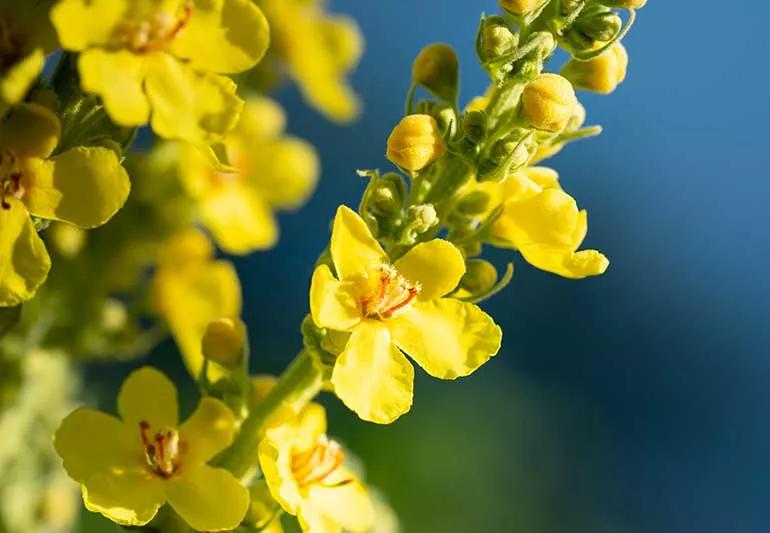Mullein (Verbascum), a common weed with a history of use in herbal medicine stretching back centuries, has found its place in modern wellness practices primarily as a soothing herbal tea.
Known for its distinctive tall stalks and fuzzy leaves, mullein grows abundantly in the mountainous regions of Africa, Asia, and Europe. Herbalists treasure mullein for its ability to address a variety of ailments, particularly those affecting the respiratory and immune systems.
What Makes Mullein Special?
Mullein’s healing properties come from its rich composition of active ingredients including flavonoids, saponins, and mucilage. These compounds imbue the plant with potent anti-inflammatory, antioxidant, and antihypertensive properties. When brewed into a tea, mullein provides a naturally sweet, earthy flavor that many find pleasant and calming.
Nutritional Benefits of Mullein Tea

Like most herbal teas, mullein tea is low in calories and carbohydrates but rich in beneficial compounds that contribute to its health-promoting properties. Drinking mullein tea can be particularly beneficial for enhancing immune health and improving respiratory function. Here’s how:
1. Loosens Mucus: As an expectorant, mullein helps thin and break up mucus, making it easier to expel from the body. This is particularly beneficial in conditions like colds and respiratory infections where mucus buildup can obstruct airways and worsen symptoms.
2. Calms Inflammation: The mucilage in mullein coats the mucous membranes of the throat and lungs, soothing irritation and reducing inflammation. This can alleviate discomfort from coughs and other respiratory conditions.
3. Protects Cells: Mullein is rich in antioxidants, such as vitamin C and flavonoids, which protect cells against damage by free radicals. This antioxidant activity supports overall cellular health and boosts the immune system.
4. Fights Germs: Research has demonstrated that mullein possesses antiseptic and antiviral properties, making it effective against a variety of pathogens, including bacteria that cause pneumonia and viruses like the flu.
How to Use Mullein

Mullein can be consumed in several forms, including teas, capsules, extracts, and oils. Each form has its uses, but tea is particularly popular for its ease of preparation and soothing effects.
– Mullein Tea for Respiratory Health: Brew the leaves or flowers with hot water to make a healing tea. Sipping the tea can soothe the throat, loosen mucus, and calm irritated mucous membranes.
– Topical Applications: For skin issues, diluted mullein extracts or oils can be applied to the skin to reduce inflammation and promote healing.
Considerations and Side Effects
While mullein is generally safe and well-tolerated, it’s crucial to use a properly diluted form to avoid potential skin reactions. High potency mullein directly applied to the skin or mucous membranes can cause irritation. However, when used appropriately, mullein does not typically provoke side effects.
Choosing and Using Mullein Safely
Due to the lack of standardization in the manufacture of herbal supplements in the U.S., finding effective and pure mullein products can be challenging. Look for products from reputable brands that undergo third-party testing to ensure quality and safety. Always follow the product’s dosage recommendations and discuss any new supplements with your healthcare provider to ensure they are appropriate for your health needs.
Conclusion
Mullein tea and other mullein-based products offer a natural, effective way to enhance respiratory health, boost the immune system, and support the body’s natural healing processes.
As with any herbal remedy, the key to safe and effective use lies in choosing high-quality products and using them wisely. Whether you are battling a respiratory infection or seeking natural ways to support overall health, mullein may be worth considering as a part of your wellness routine.



